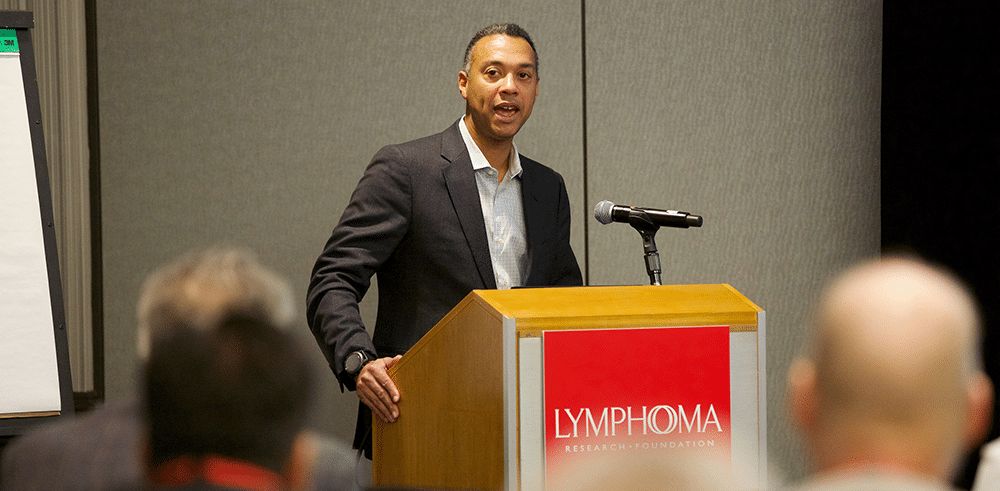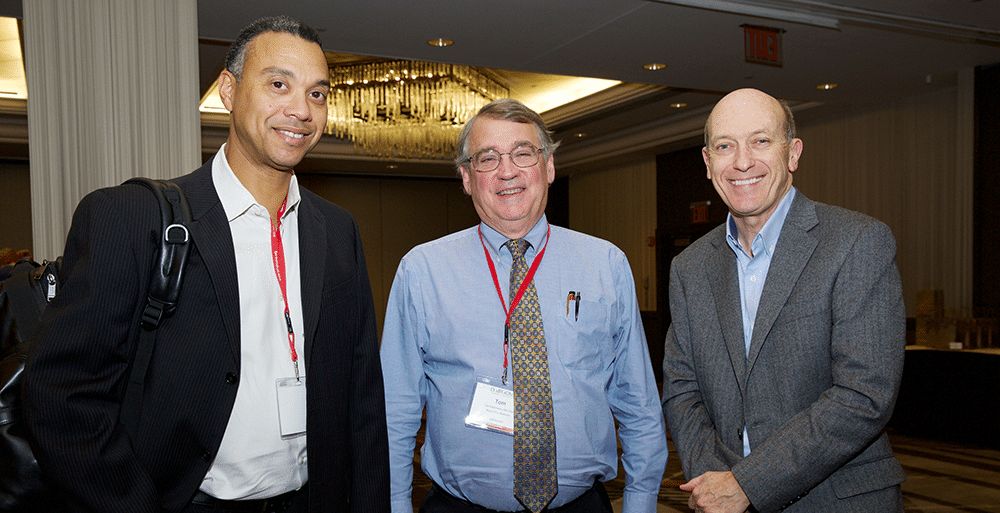
When it comes to lymphoma research, LRF Scientific Advisory Board (SAB) member Christopher Flowers, MD, MS of the University of Texas MD Anderson Cancer Center certainly believes in paying it forward. Having been supported by great mentors during his work as an oncologist and clinical researcher, Dr. Flowers is passionate about working as a team and sharing with others the same enthusiasm for medicine that he has had since the onset of his career.
“Medicine really is an incredible way to interact with people and make a difference in their lives at a time when it matters most.”
Mentors Lead the Way
During his freshman year at Stanford University, Dr. Flowers had diverse interests, studying subjects such as romance linguistics and etymology. However, it was his freshmen advisor Ken Melmon, an immunologist and clinical pharmacologist, who helped to guide his path ahead to science. “I always had an interest and passion to be in medicine,” says Dr. Flowers. “Medicine really is an incredible way to interact with people and make a difference in their lives at a time when it matters most.”
Following his undergraduate studies, Dr. Flowers attended Stanford University School of Medicine, where he not only studied medicine, but also trained in computer science and medical informatics. It was then that he became fascinated with research and how it could be applied in the clinical arena to help patients. Upon completion of medical school, Dr. Flowers moved to Seattle to complete his residency at the Fred Hutchinson Cancer Research Center. During the middle of his internship, he had plans to short-track into an allergy and immunology fellowship program, until another influential mentor opened his eyes to a different field — lymphoma. “I have been exceptionally fortunate to have great mentors throughout my career who have helped to inform my ultimate decision to be a doctor and focus on lymphoma,” he says.
During the last rotation of his internship, Dr. Flowers worked in the inpatient lymphoma wards with Dr. Oliver Press. Dr. Oliver Press, who would later chair the LRF SAB from 2006-2008. “Working with Ollie completely changed my career and piqued my interest in stem cell transplantation and clinical and translational lymphoma research,” says Dr. Flowers. “Without him and other really incredible mentors at Stanford, Fred Hutch, and Emory, I wouldn’t have decided to dedicate my life’s focus on clinical investigation.” After completing his fellowship, Dr. Flowers started his faculty career at the Winship Cancer Institute of Emory University in Atlanta, where he spent 17 years before obtaining his current position as the Chair of the Department of Lymphoma and Myeloma and interim Division Head of Cancer Medicine at the University of Texas MD Anderson Cancer Center.
Observing Outcomes
Due to the wide differences in the types of lymphoma, Dr. Flowers believes that one of the great benefits of being a lymphoma specialist is the ability to help patients across a large number of lymphoma subtypes. He feels that it not only makes his work more interesting but also creates opportunities to help patients and the medical community learn more about this complex disease. “The longer we study lymphoma, the more subtypes we discover. With these new discoveries we develop better treatments specific to lymphoma subtypes,” says Dr. Flowers. He feels that patient care gives him the best idea of what matters most to those diagnosed with the disease and helps to inform what he decides to focus his research on. “Being a clinical investigator is the best career I could possibly imagine,” says Dr. Flowers. “There is such a tight connection between understanding lymphomas, providing the highest-quality patient care and being an investigator.”
“Being a clinical investigator is the best career I could possibly imagine.”
While much research is being done in the field of lymphoma, Dr. Flowers considers it to be understudied and underappreciated compared to other more common cancers. “Lymphoma can often be more challenging to study, but the disease process stimulates my intellectual curiosity about what kinds of things we can do to make things better for patients,” says Dr. Flowers. “I feel that as oncologists, we are bestowed with the highest honor of being able to care for people during their greatest time of need, and that’s what fuels me every day.”
“I feel that as oncologists, we are bestowed with the highest honor of being able to care for people during their greatest time of need, and that’s what fuels me every day.”
One area of research that is particularly interesting to Dr. Flowers is finding ways to improve patient outcomes by using models to predict them ahead of time. “I learned very early on from patients that physicians should not only focus on improving the duration of survival. We must also work to improve quality of life,” says Dr. Flowers. “The measurement of patient-reported outcomes is really the best tool that we have to make an impact on an individual’s life after a lymphoma diagnosis.” His current study with lymphoma epidemiologist and SAB member, Dr. James Cerhan of the Mayo Clinic strives to achieve just that. The Lymphoma Epidemiology of Outcomes Cohort Study (LEO) has enrolled nearly 8,000 non-Hodgkin lymphoma (NHL) patients across eight academic medical centers in the United States. The study is helping to characterize the ways that patients with lymphoma have been treated and the best ways to predict outcomes. LEO also collects lymphoma tissue and blood samples to learn more about the biology of each lymphoma subtype. This is the largest study following patients with lymphoma ever to be conducted in the United States. The second phase of LEO will start later in 2021.
Outcome Equality
From studying outcomes Dr. Flowers recognized several important factors that can affect lymphoma patients. One such factor is the influence health disparities can have on a patient’s outcome. Dr. Flowers says that disparities occurring based on race, rural locations, socioeconomic status, and insurance status can be the difference between someone whose lymphoma gets cured or not. “When you look at large data sets and see these kinds of disparities, it makes you wonder why those issues exist,” says Dr. Flowers. “These are the types of issues that present clear opportunities for research and interventions to close that gap.”
Dr. Flowers says that there are many ways to address these disparities in lymphomas, such as improving access to care, clinical trials and supportive care. He says that these interventions could have an important societal benefit for cancer patients. “Creating equity often means that you need to create new interventions for specific groups so that everybody has the same favorable outcomes. Our ultimate aim is to achieve the greatest impact by improving outcomes for the greatest number of people,” says Dr. Flowers. He also notes that better representation will not only improve outcomes for more patients, but it can also help researchers determine the efficacy of treatments when developing new therapies.
Given the prevalence of health disparities, Dr. Flowers underlines that participation in studies such as the LEO study are critical to gathering data that can help improve treatment in the future. “One of our steps in the next five years is to recruit patients who come from those minority populations and rural environments to understand the relationships between their lymphoma diagnosis, the treatments that they receive and their outcomes,” says Dr. Flowers. With all this information, Dr. Flowers is confident that patients from all backgrounds can live longer and better lives in the future.
“Mentoring the next generation of researchers has been one of the highlights of my career.”

Student Becomes the Teacher
While improving the lives of patients is at the forefront of Dr. Flowers’ work, mentoring the next generation of lymphoma researchers is also of the utmost importance to him and one of the things that he finds most rewarding about clinical research. “My mentors were critical to my success in my career and I, therefore, pay it forward by mentoring the next generation of researchers,” says Dr. Flowers. “This has been one of the highlights of my career.”
Dr. Flowers notes that research programs such as the Lymphoma Research Foundation’s Lymphoma Scientific Research Mentoring Program (LSRMP) are crucial to advancing cures and improving the lives of those impacted by lymphoma.
Dr. Flowers takes every opportunity to mentor junior scientists not only at his own institution but also through LRF’s research programs. He has volunteered as faculty for LRF’s LSRMP workshops each year since 2012 and has personally sponsored six LRF grantees. He has also been a faculty member and led other national mentoring programs for hematologists and oncologists. “Mentorship has a compounding effect in that I see that people I have mentored throughout my career are now starting to have mentees of their own,” says Dr. Flowers. He believes that the best chance of conquering difficult diseases such as lymphoma is to capitalize on the use of team science to identify key areas where research can have the largest impact. The interaction of his mentees and other LRF SAB members and their mentees in LEO is a prime example of the great impact that team science can have on the lymphoma community.
On the horizon, Dr. Flowers hopes to move the efforts in lymphoma epidemiology to better understand who is at risk for lymphoma and why. With the brightest minds in lymphoma working together, he is hopeful that healthcare professionals in this next generation of mentees will identify strategies for predicting and preventing lymphoma.
 Read more articles and updates in the latest issue of Pulse
Read more articles and updates in the latest issue of Pulse
Pulse is a publication of the Lymphoma Research Foundation, providing the latest updates on the Foundation and its focus on lymphoma and chronic lymphocytic leukemia (CLL) research, awareness and education. Read more >
 Read more articles and updates in the latest issue of Pulse
Read more articles and updates in the latest issue of Pulse